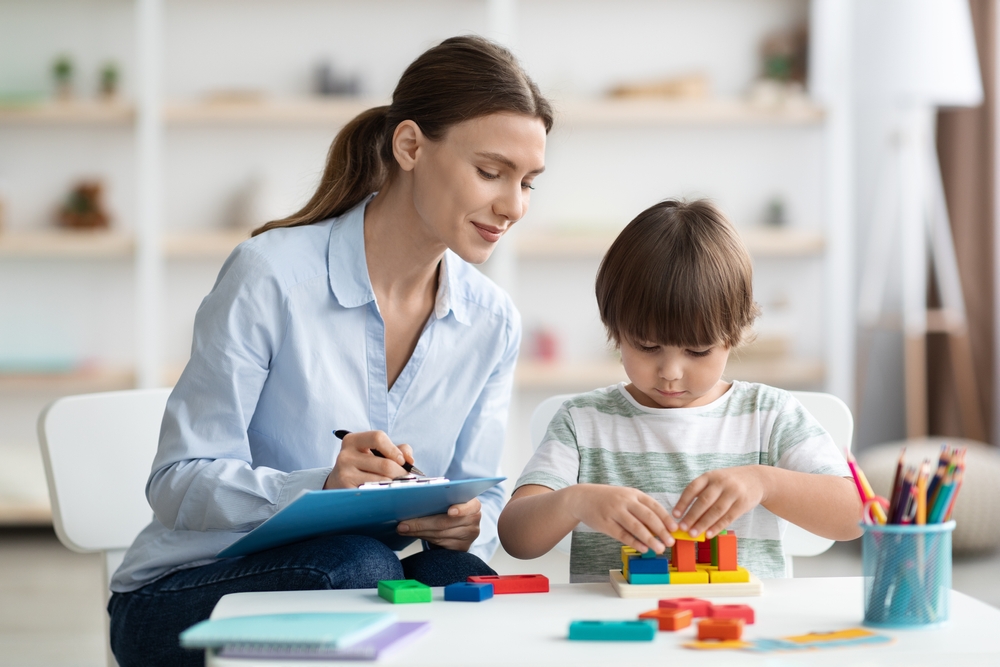Child therapy refers to a variety of techniques, approaches, and interventions that can be used to treat a wide range of issues from emotional and behavioral problems in young children, to mental health ailments in adolescents and young adults.
Child therapy helps young individuals understand and manage challenges (e.g., mental health conditions, behavioral issues, traumatic events, etc.) that affect their mental health.
There are many different forms of psychotherapy that are used in the treatment of child and adolescent psychiatric disorders including, cognitive behavioral therapy (CBT), dialectical behavior therapy (DBT), family therapy, group therapy, interpersonal therapy (IPT), mentalization-based therapy, parent-child interaction therapy (PCIT), play therapy, psychodynamic psychotherapy, and more. The Indian Journal of Psychiatry outline general principles for mental health clinicians providing children and adolescents with psychotherapeutic treatment. While working as a mental health professional with children and families, it is important to:
- Listen carefully and take different perspectives into consideration.
- Appreciate and see the world from the child or adolescent’s viewpoint as well as from those of their parents.
- Be mindful of the fact that the lives of children and parents are inextricably linked, and it would be virtually impossible to help one without helping the other.
- A child therapist must appreciate and understand the professional context from which they operate (e.g., their personal style and beliefs as workers, the theoretical models they subscribe to, the standing and context of the agency with which they work, and the overarching values and goals of their profession).
Counseling children can be difficult for any number of reasons, particularly when traditional talk therapy serves as a barrier in communication. Further, due to the internal and external developmental transition from child to adult, many adolescents exhibit a great deal of resistance to therapeutic treatment approaches. Therefore, it is advantageous for mental health providers to equip themselves with a variety of creative techniques that promote both verbal and nonverbal expression in a way that fosters engagement. Experts assert that therapeutic engagement reflects the quality of the interaction, the collaborative nature of developing tasks and treatment goals, and the therapeutic alliance between child and therapist. Effective child therapy may include a combination of elements such as talking, playing, or other activities to help the child express feelings and thoughts.
Further Information and Support
For most of us, life can be very stressful, leading us to feel emotionally charged, which can cause anxiety, panic attacks, depression, and getting stuck in a cycle of being burdened with negative thoughts. Navigating through the challenges and emotional turmoil of life can be overwhelming, but you do not have to go through it alone. Engage Treatment is a Joint Commission Accredited professional psychological practice. We specialize in treating children, teens, and young adults struggling with depression and anxiety through community-focused treatment plans that incorporate a carefully selected combination of therapeutic interventions. Our compassionate, multidisciplinary practitioners are devoted to providing the highest quality of care that helps ignite positive change and enables clients to reach optimal health and well-being. Please do not hesitate to reach out for guidance. We are happy to answer questions and provide you with any additional information. Feel free to call us at 805-497-0605 or email us at [email protected]. You are also welcomed to get in touch by filling out our contact form. We look forward to connecting and having the opportunity to discuss how we might best be able to support you.
Contact Us
Westlake Campus:
IOP Program
2625 Townsgate Road, Suite 210
Westlake Village, California 91361
Agoura Campus:
Private Therapy & Parenting Program
30300 Agoura Road, Suite 250
Agoura Hills, CA 91301
805-497-0605
805-371-4862











© 2023 Engage Treatment Program, Inc. All Rights Reserved.
LGBTQ Friendly
About
• About Engage
• Our Team
• Career Opportunities
• Individual / Family Therapy






